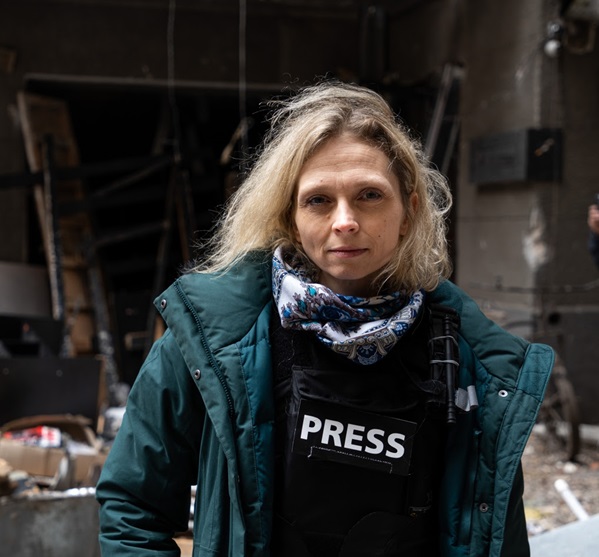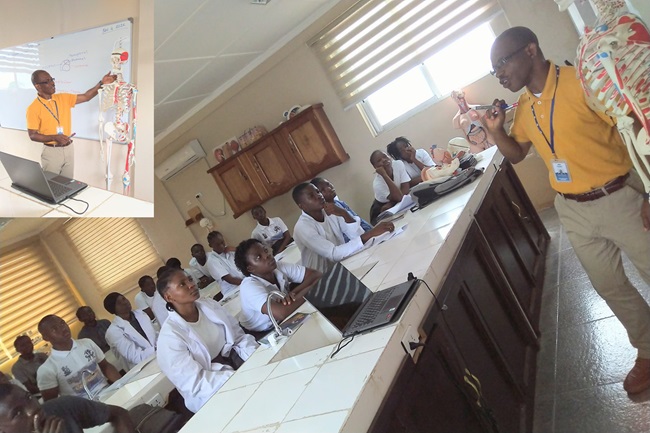PARIS — Ukrainian authorities should reverse their decision to cancel the accreditation of Danish journalist Matilde Kimer and let her work freely in Ukraine, the Committee to Protect Journalists said Thursday.
On Monday, December 19, Danish public broadcaster, DR, reported that its reporter Matilde Kimer was stripped of her accreditation with Ukraine’s Ministry of Defense for allegedly producing Russian propaganda. Kimer told CPJ in a phone interview that a Ukrainian official suggested that she produce “good stories” on Ukraine to get her accreditation back.
“Ukrainian authorities should reinstate Matilde Kimer’s press accreditation immediately and allow her to continue covering the war in Ukraine,” said Gypsy Guillén Kaiser, CPJ’s advocacy and communications director, in New York. “Independent media are vital for coverage of the conflict. Revoking accreditation or requesting ‘good’ coverage in order to restore it is a practice unworthy of a democratic country. Authorities must ensure this type of incident is not repeated.”
On August 22, Ukraine’s armed forces emailed Kimer, telling her that her accreditation had been revoked following an order from Ukraine’s security service, known as SBU, she told CPJ. After months of trying to get an explanation from the SBU, she met with its representatives on December 8 through the Danish embassy in Kyiv.
An SBU representative named Oleg told her that some of her personal social media posts, including a May 2017 Facebook post, with photos of a military parade in the self-declared Donetsk People’s Republic (DPR) showing St. George ribbon, which Oleg called “illegal soviet propaganda,” had raised suspicions that she was “biased.”
Oleg also told Kimer that she could not have done interviews with DPR officials unless she was “somehow involved with them.” Kimer told Journalisten, a magazine published by the Danish Union of Journalists, that SBU did not provide specific examples of her work that could have prompted the withdrawal of her accreditation.
Oleg told her that it would be difficult to reverse her case, and suggested she write “good stories” about Ukraine or use SBU photos and videos for a couple of months before having her accreditation reassessed.
“I told him, ‘Thank you very much for that offer, but as an independent journalist I cannot publish stories about something that I did not witness, about people I did not talk to. This is not journalism. This is working in communication.’ And then the meeting ended,” Kimer told CPJ.
Ukraine’s ambassador to Denmark, Vydoinyk Mykhailo, told daily newspaper Politiken: “We are certainly not trying to pressure her to report anything she doesn’t want to or limit her journalistic activities. We just want journalists to comply with the rules.”
Mykhailo told Politiken that Kimer had broken Ukrainian travel regulations three times, citing unauthorized trips to Russian-occupied Crimea in March 2015, to Donbas in 2016-2017, and to the southern Ukrainian Mykolaiv region in July 2022. Kimer said that she traveled to Crimea before Ukraine adopted new rules for entering the peninsula and told CPJ that she did not enter Donbas through Russia in 2016-2017. She told her outlet that she traveled to Mykolaiv without proper authorization because she did not know she needed it; the situation was quickly resolved.
Mykhailo said that Kimer could not report from the front line anymore but that she was still allowed to work in Ukraine.
Kimer told CPJ that being deprived of her accreditation means that she cannot cover Ukraine as a journalist since many places ask for the press accreditation. “I cannot make a single report that shows the consequences of this war or the suffering of the Ukrainian people or the acts of war themselves,” she told her outlet.
Since 2009, Kimer has worked as a DR correspondent in multiple countries, including Russia and Ukraine, media reports said. She recently received and was nominated for multiple prizes for her coverage of Ukraine. In August 2022, Kimer was banned from entering Russia for 10 years for “security and defense reasons,” her outlet reported.
In November, Ukrainian authorities stripped several Ukrainian and international correspondents of accreditation for reporting on the newly liberated city of Kherson, media reported.
CPJ emailed the SBU, Ukraine’s Ministry of Defense, and Ukraine’s embassy in Denmark, but did not receive any reply.







